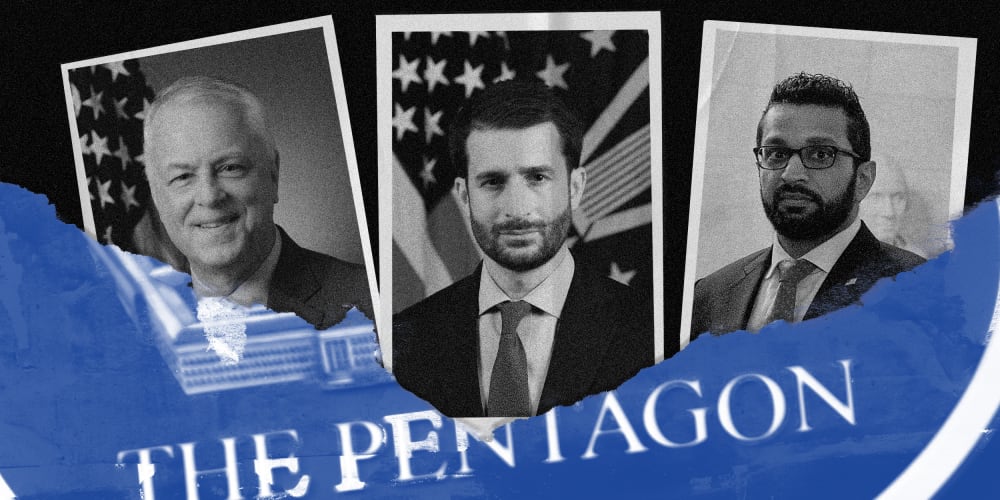Remember when President Donald Trump used to be all about “my generals“? He had John Kelly as first his homeland security secretary, then as his White House chief of staff, then as a pariah; James Mattis as his defense secretary, the only one who saw the futility of his task and quit before he could be fired; and H.R. McMaster, the warrior scholar, as his second national security adviser. But one by one, his generals all failed to be as loyal and subservient as he required them to be.
Now, instead of the “adults in the room” — all of whom have been scattered to the winds and various book deals — keeping Trump’s worst instincts in check, we have henchmen in the room at the largest federal agency. These are political appointees who’ve been deemed deeply unfit for office or have twisted national security issues for Trump’s benefit or sometimes both. And it’s not clear what they intend to do with the time they have left.
Defense Secretary Mark Esper was — until his sudden firing via tweet on Monday — one of the few Cabinet members left who has publicly disagreed with the president. His departure cleared the way for a whole slate of firings and reshuffling in the Pentagon’s E-Ring, where the highest-ranking civilians have office space.
Esper’s replacement, acting Defense Secretary Christopher Miller, isn’t thought to be deep in Trumpland — he was running the National Counterterrorism Center before his abrupt promotion. But he’ll be surrounded by a lot of people who think like Trump.

Miller’s agenda will be shaped in large part by his new chief of staff, Kashyap Patel. Patel has been at the heart of some of the dumbest and noisiest intelligence-related scandals of the last four years. He joined the House Intelligence Committee staff under then-Chair Devin Nunes, R-Calif., in 2017 after a few years of service at the Justice Department. He almost immediately joined in Nunes’ hunt for proof that the FBI and the Justice Department had done something nefarious when they began the Russia investigation.
The fruits of their efforts — the secret four-page “Nunes memo,” which Trump cleared for release in 2018 — had Patel as its main author. In it, GOP committee staffers alleged that the FBI had basically lied to get a surveillance warrant against a Trump campaign staffer and that the investigation was biased from the jump. It was all a big to-do at the time, but it didn’t override the conclusions of the Mueller report when it was released or get anyone fired or do much of anything, really, except serve as a Republican talking point.
Patel moved early last year to the White House National Security Council, where, as a senior member of the counterterrorism desk, in a role created especially for him, he for some reason wound up with his nose in Ukraine policy. His name came up repeatedly during the impeachment hearings as that of someone who was feeding Trump’s belief that Ukraine was rife with corruption and that it, not Russia, had meddled in the 2016 election. It got to the point that Trump was reportedly convinced that Patel was the one in charge of Ukraine policy on the council. Phone records released during the hearings also showed that he’d been in touch with Rudy Giuliani during Giuliani’s efforts to force Ukraine to investigate Joe Biden — as had his old boss, Nunes.
Patel then shifted to the office of the director of national intelligence this year — during Trump stalwart Richard Grenell’s brief tenure as acting director — ahead of his new job as one of the most powerful people at the Pentagon.
These are political appointees who have been deemed deeply unfit for office, twisted national security issues for Trump’s benefit or sometimes both.
Then we have Ezra Cohen-Watnick, who will be acting undersecretary for intelligence and security. He was brought onto the National Security Council staff as a protégé of Trump’s short-lived first national security adviser, Michael Flynn, back in 2017 and quickly became an ally of Trump’s son-in-law-turned-White House Swiss Army knife, Jared Kushner. Even though he was only 30 years old at the time, he was already ensconced in a senior position, liaising between the White House and intelligence agencies, which confused the hell out of many people. McMaster tried to fire Cohen-Watnick and failed before Kelly became chief of staff and managed to turn him loose. He parked at software giant Oracle, itself led by a Trump supporter, before rejoining the administration without fanfare in March.
Importantly, at the start of Trump’s “Obamagate” claims in 2017 — a conspiracy too inane to detail here — Cohen-Watnick started looking into intelligence gathered during routine surveillance of foreign nationals, allegedly looking for something to back up Trump’s wild claims. He was then one of two officials reported to have passed that highly classified information to none other than Nunes. (His lawyer denied that was the case in 2018.)
The “unmasking” scandal Nunes kicked off with that information died a quiet death in October. Meanwhile, the other staffer, Michael Ellis, was just installed as the top lawyer at the National Security Agency. (Surely that won’t be a problem later.)
This is clearly not the group of people you want acting as the civilian hands steering the world’s most powerful military.
And then there’s Anthony Tata, who will now be the No. 3 official at the Defense Department — sort of. The Pentagon was a bit more specific in its announcement: “Mr. Tata is the Senior Official Performing the Duties of the Under Secretary of Defense for Policy. He previously was the Senior Official Performing the Duties of the Deputy Under Secretary of Defense for Policy.”













